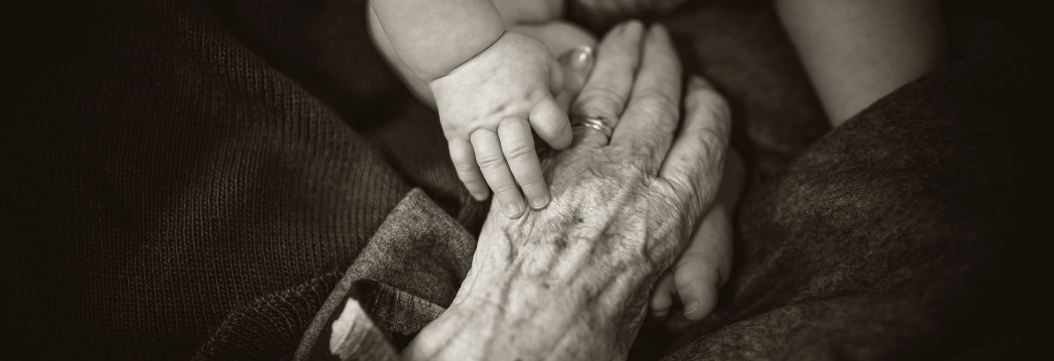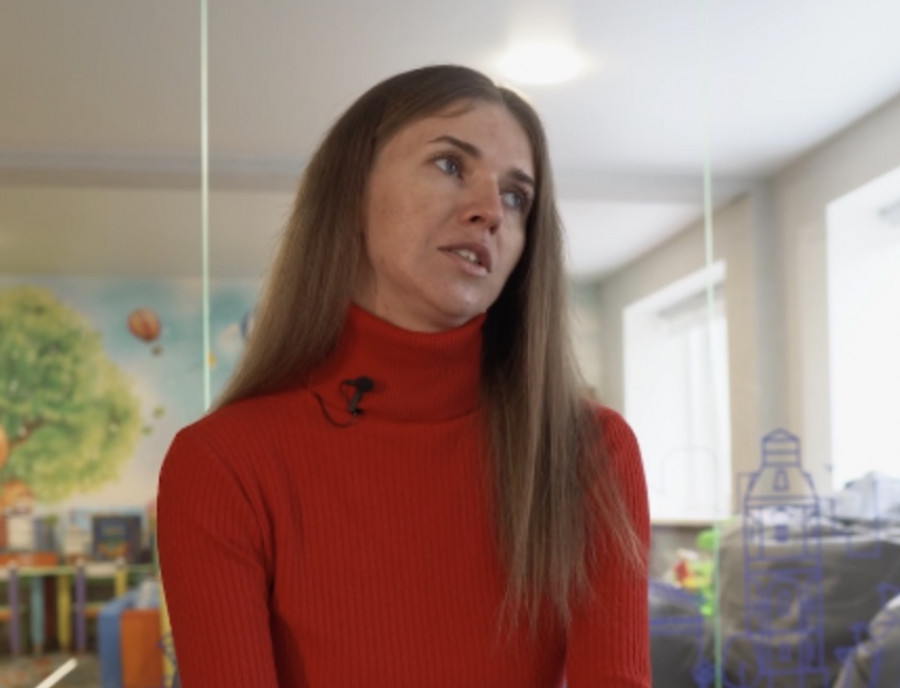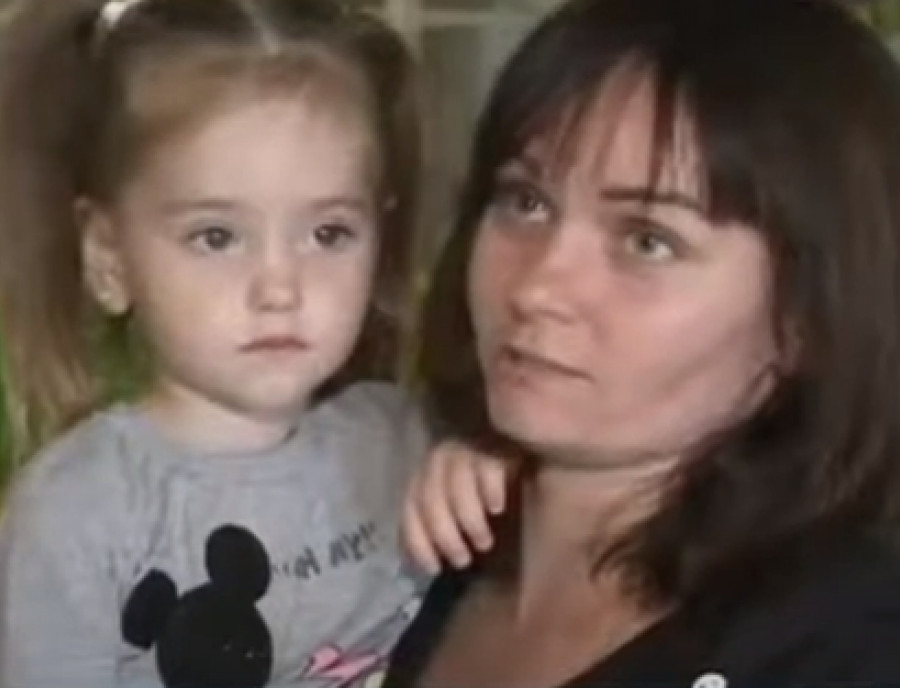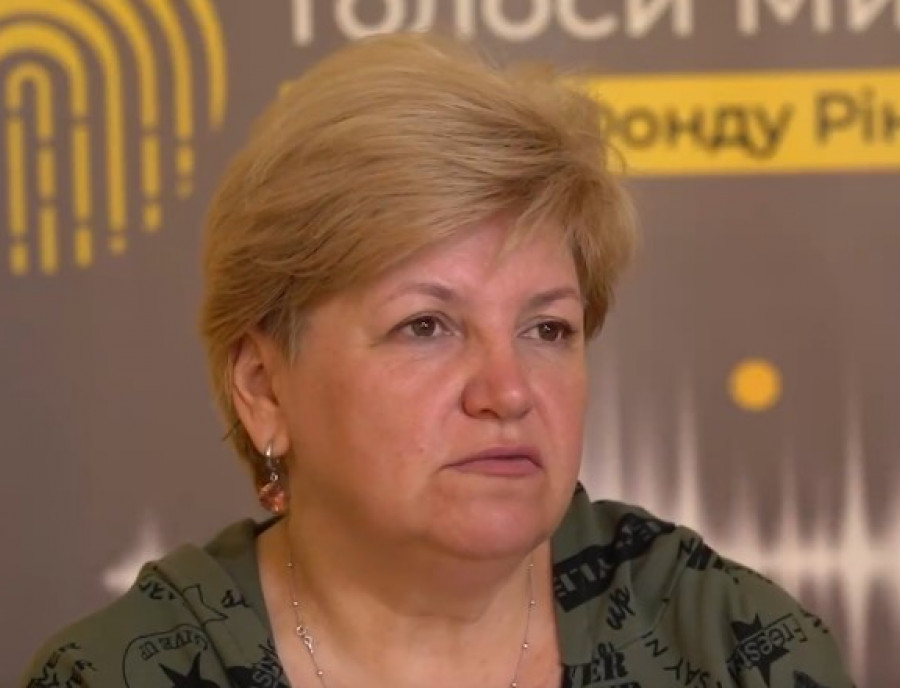Three days before the war, Yuliya left for Warsaw. On 24 February, she was on her way back to Ukraine. First, for several days she was looking for her daughter who went to the bomb shelter and was out of range. Under shelling, she pasted up [missing person] ads, but then met her daughter just by chance near the market.
Then an aerial bomb landed in the yard, leaving a crater 10 metres deep and 4 metres wide. “It was very scary. A plane was flying and dropping bombs, while we were standing in a small premise on the staircase, praying, “if only it would fly past,” the woman recalls.
On 16 March, the family left Mariupol. They drove past some burnt houses, tanks with “Z” marks, and dead bodies along the roads.
On 24 February, at 18:00, I was already in Lviv. I realized what was in front of me at the station. I saw how groups of our military were gathering. They were gathering in groups and leaving. I saw all this movement and assumed that everything would be very bad, grief... Or how to call it? I managed to get a ticket for that same day and at 00:40 on 25 February, I left Lviv for Mariupol by train. In front of my eyes, as they say...
When on the train, I realized that some military were leaving and other military were entering, some kind of regrouping or rotation. I heard some talks that someone was in Berdiansk and they were bombed, and now they were in Dnipro. Soldiers were called back from their leaves. That was it. Everything that was developing around me whipped up my stress more and more...
Everything was very bad. While we were travelling, our train, which was the first Lviv-Mariupol train I travelled on, did not reach Mariupol.
During that time, Volnovakha was bombed. And our train was the first that came to Pology. Two more trains arrived next: from Kyiv and from Odesa, which brought some more people. There were not many of us on the train. Maybe some 20-30 passengers. Well, those were all the passengers who were supposed to go to Mariupol.
Mostly men with big bags, that is, people coming back from work, from business trips. And there were a couple of women, including myself, who were returning. Mostly, everyone was traveling from Mariupol and not to the city. That is, on 24 and 25 February, there were evacuation trains that I knew about. My family, my daughter and husband, they did not want to [leave]. They stayed and said, “Mum, don’t worry. Everything will be fine.” So I had to go [to them], and we were making our way further on, from Pology. It was not quite easy either because the regular public transport routes were closed. The men hired some kind of a minibus, which was designed for 18 people, but we all boarded it, including 27 bags.
And so we drove on for an hour and twenty minutes from Pology to Mariupol, like sardines in a can. Already then, we saw some damaged military vehicles along Zaporizhzhia highway. Approaching Port City, there were practically no checkpoints. There was one Ukrainian checkpoint where they checked us as a formality, and there was no one at all near Port City. We were dropped off and we all began to slowly disperse. It was impossible to call a taxi and public transport did not run. Everyone was picked up on a call, arranging it on an individual basis.
All of us, all the 27 people who arrived in Mariupol, were picked up. It was difficult to travel at that point. I live in the left-bank part of the city and it was difficult to get there. I needed to cross the bridge... I ran across the bridge on foot and my husband met me on the left side of the Post-bridge and drove me home to the left bank, where on 26 February power and water supply were not available anymore. Only gas was still available.
Basically, from that moment, my war began. That is, with confusion, with a lack of understanding of what was happening.
My daughter, her boyfriend and his relatives went somewhere to a private houses’ area, as she said... I asked, but she said, “Mum, everything is fine. We have a bomb shelter there.” A private houses’ sector, well, basically, I thought that there was a telephone connection, but I didn’t ask for the address. On 1 March, the building-trade technical school in the district where we live, on Leningradskyi Avenue, was hit by shellfire. The situation was very hot and talking to my husband I insisted on us leaving – we had our second apartment on Leninska Square.
There are some Stalin-era buildings with good basements there. And we planned to stay there for one night. We took our cat, our passports, some cat food and that was it. We went there for one night. It was on 1 March. But we could not return to our place anymore because on 2 March the situation on the square escalated so much that we could not even stick our heads out. The first mine in the yard landed on our car.
We could not leave anymore. We did not know what to do, so we stayed. Some strangers provided us with food because everything we had was left in the other apartment.
On 5 March, there was some kind of a break in shellfire and I noticed that people began to pack up their things. Well, in a neighbouring yard, people began to pick up their cars and were going to leave somewhere. I asked what happened, but there was no telephone connection. There was no telephone signal from 2 March. So I saw that they were packing up. I asked, “Where are you going?” They said that the evacuation was announced today. Everyone was going to the Drama Theatre. We did not have a car, but we were lucky as my friend took a train and left her car filled with fuel near my mother-in-law’s house. And it happened so that her husband came there, but he could not drive. He did not have a driving license, while my husband and I did not have a car, but had driving licenses. So we teamed up and two families left the left-bank part of the city.
On 5 March, we drove up... It was also scary to drive across the bridge. Everything was flying just over our heads. We drove up to the Drama Theatre. People there told everybody to turn around and leave as nothing was going to happen there. There was no evacuation. We had to return. Everything was closed. I just looked around and saw that the city centre was still a paradise compared to the left bank. People were walking around. It [artillery] just flew over the centre, while the left bank was all smashed and damaged. I said, “I won’t go to the left bank. I am not going back because it’s very scary there.”
And so we stayed in the city. We had only our cat, our passports and that’s it. My husband and I did not have anything else.
We came to his cousin and our acquaintances were also nearby, together with their parents. We decided to stay there for some time, until something could become clear about the possibility to leave. We hoped that the city could not be destroyed, levelled with the ground, as it is the 21st century, after all... I did not think that it would last so long.
We were left without any information. The only information that I got was near our house, where we stayed. There was some shack there and some news was posted there on paper sheets. We just did not know if there was the country still, if there was the president. We didn’t know what was going on in the world. Well, as I said, we were like poor relatives. We had nothing. We were fed by my husband’s cousin and nephew, for which we are extremely thankful to them. And we also had our cat with us... He survived those basements and flats together with us. One more detail. I lost contact with my daughter. I lost contact and I didn’t know where exactly my daughter was with her boyfriend’s family. I decided…
Well, on 5 March, we returned to the city, and on 6 March, I started running to the 17th micro-district, where all the bomb shelters were, as well as the trade technical school, and the seaport facilities. I started running there every day and posting [missing person] ads, and I think that many Mariupol residents saw them because my friends then asked me, “Yuliya, is this your ad?” I wrote, “Vlada, Daniil, Anzhela, we escaped from the left bank. We are alive and we are at Aunt Natasha’s place, in Kirovskyi district.” On 6-9 March, I ran under shelling, ran up to people who were near bomb shelters and they told me right off, “No, they didn’t contact us. No one has been found.”
I started walking around and looking at people. There were long queues for water and for humanitarian aid there. I thought that... well, somehow they had to let me know about them. But I couldn’t meet them.
On 9 March, I was coming back upset and just by chance met them near California market. My Lord, I was so happy! I found them. They told me that they were not at the 17th micro-district. Well, since my daughter is from the left bank, she was a bit wrong about their location. Well, the main thing was that we found each other. They then came to us, to the place where we survived until 16 March. Because starting from 10 March, planes began to fly around and drop air bombs. In our yard, on Metalurgiv Avenue, an aerial bomb fell.
On 9 March, an air bomb landed near the maternity hospital, and on 10 March, a similar bomb fell on Metalurgiv Avenue. It’s all before our eyes. We remained alive by miracle. And every time you realize: it was all very scary. Now you begin to realize it, but then it was like by inertia.
A plane was flying, or several planes, and dropping bombs. You are standing on the staircase. You are standing and just, “God, let it fly past!” And when you see this crater from an aerial bomb, you understand that all these basements, these semi-basements, they can hardly help from what this air bomb can cause.
Well, that’s how we were surviving. Searching for water, cooking on fire, well, it was like an ordinary thing then... All Mariupol residents were like that. I won’t tell you anything new. And I won’t surprise anyone. This is how we all survived. Every time you hear, “Air, air!” We all run and hide. Once you go out to get some fresh air – an air raid warning again! We all run away again. Well, that was it. There was a state of helplessness. We realized that we were simply helpless in terms of protection from airplanes. We had no chance. Moreover, we saw dead bodies lying along the roads, although I didn’t go far from home. But people walked past us and told us where, what and how. It was a kind of a word of mouth.
On 14 March, the first wave began, when people started fleeing. The evacuation. But it was rather an escape than the evacuation. A couple of cars left from our house. We were undecided about leaving. On 15 March, we did not leave either, and on 16 March, we had to run to the 17th micro-district. The parents of my daughter’s boyfriend were there. We wanted to tell them that we were going to leave by cars. In the morning of 16 March, we ran there through Novoselivka.
I saw a burnt nine-storey building on Shevchenko Boulevard. I saw some dead bodies along Shevchenko Boulevard.
And a man who was standing there said, “Please, don’t run along the boulevard because they are shooting here. You better go through the yards.” And we ran through Novoselivka. I saw those craters from air strikes. Where the house had stood, there were just craters left.
Novoselivka was heavily bombed, and we did not find his parents. We ran to the house where they had been. The house was destroyed and some strange woman was staying in one room, in the room that remained intact. We asked where the owners of the house were. She said, “I don’t know.” And we realized that we could not find the parents. On 16 March, aircrafts appeared. That’s it, we had to do something, but we could not get together. I said, “Let’s run. Since they are not here, let’s run to the area of the bomb shelters.” And so we ran. We ran up to the technical school, and on a small lane, which goes to Nikitina Street, a tank with “Z” sign pointed its muzzle at us. And I realized that there were not Ukrainian troops at the 17th micro-district. When we were running, we saw some Ukrainian [military] uniforms that were dropped off.
I realized that some “Z” marked tanks were already three metres away from me. We turned around, ran quickly and came to our place at Kirovskyi district. We said that we had not found the parents. However, we were still going to leave anyway. We packed up literally in half an hour, but we were still thinking whether to leave in that direction or not to leave.
But when I saw a tank with this “Z” sign, we made our final decision – that we could not delay it anymore, as nothing good was going to happen.
It happened so that the trip was not a planned one. Several cars gathered, our families, not in an organized manner. And at that time it turned out that there was no place in our car for my children – my daughter and son-in-law, whom we found earlier. So we left, seven people, on a Ford car. My daughter was sitting on my lap. My son-in-law was on the lap of the car owner. My husband has a disability; he has problems with his leg. That is why it was going to be a hard ride, but we left. We drove 19 hours to Berdiansk. But thank God, on 16 March, we left there. When we stood in a queue to leave Mariupol, it was scary.
It is one thing when you’re inside the city and you haven’t seen everything that happened, that is, you’ve only seen the result. But here you could see how Grad MLRS rockets were flying from the direction of Mangush. We could see how the city was simply burning. It’s even scarier.
You understand that now everything can turn around, and what flew to the city would fly towards us, and we were in those cars like in tin cans. The air temperature was eight degrees below zero. All this was very difficult. That was the situation. We barely made it to Berdiansk. It was no longer possible to go to Mangush.
Constant checks. It was a very difficult trip, but we arrived in Berdiansk. We stayed in Berdiansk for four more days to re-fuel, and on 21 March, we left for Zaporizhzhia. That was when our eyes were welled up with tears… On seeing the first Ukrainian military – it was tears, it was happiness, it was the understanding that this hell (for me it was three weeks of hell) was over for us. And the understanding that now I can, well, that I can feel like a human. First of all, like a person of the 21st century, where there is electricity, water, and peace. Well, where Ukraine is, in general. A civilized European country that does not have all these horrors because, as everyone probably said...
These 15 checkpoints from Berdiansk to Zaporizhzhia where the Russian military were, where the so-called “DPR” soldiers were, all of them without any insignia. I even asked one, “Who are you?” He said, “We are the Donetsk People’s Republic. Why are you going to Zaporizhzhia? In two days, there will be a scramble, a battle there.”
I looked at him and thought, “My God, you care about us so much now, while you have destroyed my city, and my life.”
It is clear that this was all for whipping up tension from their side. Each of them just voiced some things to stir up stress even more. I hope, and I just really want the war to end with the victory of Ukraine, but I don’t know. I won’t be able to predict how quickly because so far I don’t see any such signs signalling the end of the war. I want my country to win, of course, my dear Ukraine. I really want this.
When quoting a story, a reference to the source – the Museum of Civilian Voices of the Rinat Akhmetov Foundation – is mandatory, as follows:
The Museum of Civilian Voices of the Rinat Akhmetov Foundation https://civilvoicesmuseum.org/






